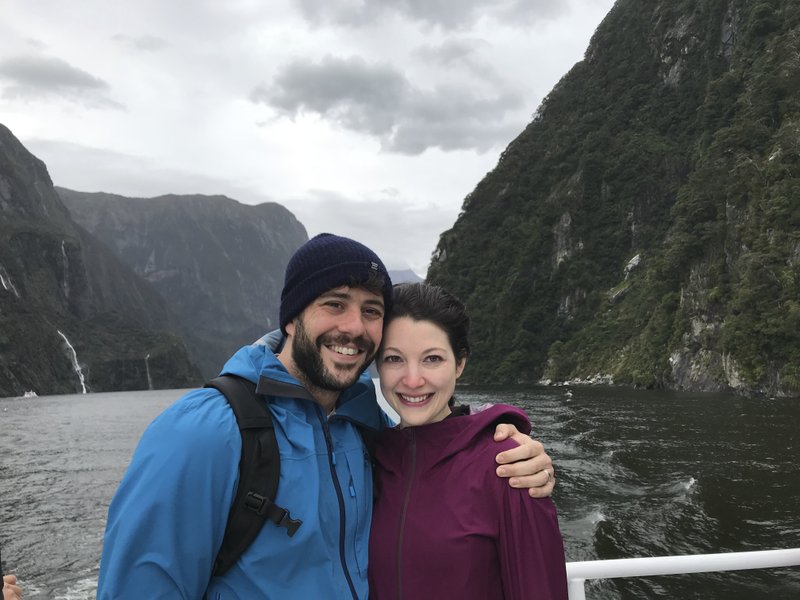When Lila Chess and Aron Kandel were planning their January wedding, the New York couple was wary of acquiring too much stuff. They lived in a small apartment with limited storage. Lila opted not to have a shower in order to keep gifts at a minimum.
But the couple knew that friends and family would want to celebrate their nuptials with presents. They found a registry that included traditional gift options but also things other than stuff -- donations to charity and to their honeymoon adventures in Fiji and New Zealand.
"People were really excited about the chance to help with our honeymoon," recalled Lila Chess Kandel. "Friends and family who know us said, 'That's awesome. You guys are super-adventurous. We want to support that.'"
As couples strive to infuse their weddings with personal touches, changing up the registry is a natural, said Ashlie Lynch, communications chair for the American Association of Certified Wedding Planners. Many brides and grooms are forgoing formal dinnerware and household goods and replacing them with requests for money to finance experiences or significant purchases.
Couples are becoming increasingly comfortable asking guests for money, added Lauren Kay, deputy editor at TheKnot.com, a wedding planning website.
Between 2011 and 2017, the number of couples who had cash registries increased from 1 percent to 6 percent, according to a survey by TheKnot.com. In many cases, couples provide detailed explanations on the registry of how they intend to spend the money. Requests range from down payments on a house to in vitro fertilization treatments. That information "makes guests feel better about handing over cash," Kay said. "It's reframing the way we think about gifts."
It also suits the lifestyle of millennials -- those born between 1981 and 1997. Three out of four millennials said they prefer spending money on experiences over things, according to a 2017 Eventbrite survey.
Some resorts that cater to honeymooners offer registries. At the Fairmont Orchid in Hawaii, couples can request that friends and relatives chip in toward spa treatments, romantic dinners and sunrise canoe outings. "We've seen many couples who've exercised this option with success and have enjoyed their once-in-a-lifetime dream honeymoons as a result," said resort spokesman Catherine Cambra.
Kayleigh and Daniel Caskey, who were married in 2017, had no problem asking guests to contribute to their honeymoon.
"It was a way of saying, 'Hey you were part of our wedding day and now you're a part of a time when we're celebrating our marriage together that you can follow on Facebook,'" Kayleigh said. Many traditional gifts "will break or wear down and have to be replaced. We'll never have a honeymoon again. We will always remember those experiences."
Most of their friends and relatives understood, she said, but a few still bought traditional gifts that the couple isn't sure they will ever use.
Before their 2016 wedding, Brady and Erica Robertson had a talk with one relative to ensure she did not "surprise" them with china they would never use. "When friends and family visit, we are more likely to order pizza and eat off paper plates than to provide an elaborate meal," said Erica, of Columbus, Ohio. "We didn't want a lot of extraneous gifts because we didn't have a lot of room to store everything."
Charity wedding registries more than tripled in popularity last year, Kay said, from 3 percent of couples in 2016 to 10 percent in 2017.
Initially, Sarah Mulvaney and Matthew Schimenti intended to tell wedding guests they did not wish to receive any gifts for their June event, but relatives persuaded them to provide an option. The couple from Rowayton, Conn., decided to use their happy occasion to help a favorite charity. Using The Good Beginning, a registry for couples seeking charitable donations in lieu of gifts, the Schimentis solicited donations for The Carver Foundation, which provides youth programming in Morris, Conn.
"To us, our wedding was always about celebrating our love and the coming together of everyone we both love," she said. "We have all that we need, and giving back was the least we could do."
It makes sense that millennials would redefine traditional wedding registries, said Karen McGrath, co-author of The Millennial Mindset: Unraveling Fact From Fiction and a professor at the College of Saint Rose in Albany, N.Y. Millennials tend to prioritize volunteering, taking care of the environment, and doing things rather than owning them, she said. Everything about fancy china and crystal -- from storing it to the packaging it comes in -- would be a turn-off for many young couples, she said.
High Profile on 12/30/2018
